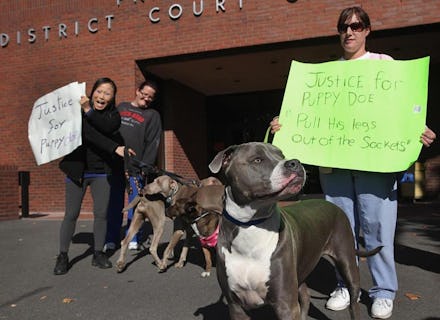What We Should Say to Animal "Lovers" Who Only Love the Cute Ones

People from around the world were rightfully outraged a few months ago when "Puppy Doe," a young pit bull in Quincy, Mass., was found brutally tortured and severely beaten. Half her normal weight, the dog had several fractures to her skull and body. She was stabbed in the eye, had her tongue sadistically cut, and was left for dead near a playground. The dog was later euthanized after veterinarians determined that her wounds couldn't be healed.
As a self-professed animal advocate who's rescued at least a few pit bulls and stray cats in my day, "Puppy Doe"'s story was absolutely heart-wrenching for me. Even though a suspect has now been charged in the case, it serves as a painful reminder of the need for stronger animal-cruelty laws, which even in supposedly liberal Massachusetts only call for jail time of up to two and a half years in a house of correction, up to five years in a state prison, and/or up to $2,500 in fines for each cruelty offense.
But the reason I became a vegan at the age of 14, and the reason so many Americans care about how we treat other animals, isn't only to protect our closest companions like dogs and cats. It's also to address the plight of billions of other animals killed for food, fur, research, and recreation each year in the United States, all too often in cruel and unsavory circumstances.
That's usually when people's eyes glaze over and fill with the distasteful image of a PETA-loving, vegan hippie telling them how immoral their lifestyle is. But given the many people who instantly labeled Puppy Doe's abuser a "monster," I wonder if we're being disingenuous and need to reexamine what our love for animals really means.
Take, for example, the USDA's pending decision to speed poultry-processing lines for chickens and turkeys. One million of these animals are already boiled alive each year, in part because no federal law exists to regulate their welfare during slaughter. But amid growing pressure from the poultry industry, the USDA wants to increase slaughterhouse line speeds even further, to a mind-bending 175 birds per minute in chicken plants and 55 per minute in turkey plants. This decision is dangerous for animals, of course, but also for slaughterhouse workers, a job that's often called "the most dangerous job in America."
And then there's the recent undercover investigation by the animal advocacy organization Mercy For Animals, which documented Walmart's pork suppliers routinely beating, mutilating, and intensively confining pigs with complete disregard for their well-being. Walmart has condemned these findings as "unacceptable," but the undercover video speaks for itself:
Sadly, there's little incentive for companies like Walmart and federal agencies like the USDA to change their ways. With few laws protecting farm animals, state legislatures have added to the problem in recent years by passing "ag-gag" laws, which make it a crime for potential whistleblowers to document conditions at factory farms and other facilities. And Congress is now considering adding the King Amendment to this year's farm bill, which would invalidate state animal protection laws like a California statute that bans the intensive confinement of egg-laying hens, breeding sows, and veal calves.
Protecting a cow, chicken, or pig may feel very different than ensuring dogs like "Puppy Doe" don't face a similar fate. After all, the victims of farm animal abuse don't have names, they aren't as cute and cuddly as Fido and Fluffy, and there isn't only one disturbed perpetrator that can be held accountable for their mass suffering. But in a nation of self-identified animal lovers, where even horses are on the chopping block, we have a strange way of showing our affection.